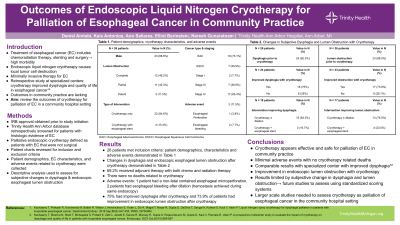Sunday Poster Session
Category: Interventional Endoscopy
P1057 - Outcomes of Endoscopic Liquid Nitrogen Cryotherapy for Palliation of Esophageal Cancer in Community Practice
Sunday, October 27, 2024
3:30 PM - 7:00 PM ET
Location: Exhibit Hall E

Has Audio

Daniel Aintabi, MD, MSc
Trinity Health Ann Arbor Hospital
Ann Arbor, MI
Presenting Author(s)
Daniel Aintabi, MD, MSc1, Kais Antonios, MD1, Ann Saliares, MD2, Elliot Berinstein, MD, MSc3, Naresh Gunaratnam, MD4
1Trinity Health Ann Arbor Hospital, Ann Arbor, MI; 2University of Kentucky, Ann Arbor, MI; 3Michigan Medicine, Ann Arbor, MI; 4Huron Gastro, Ann Arbor, MI
Introduction: Endoscopic application of liquid nitrogen cryotherapy causes local tumor cell destruction, offering a minimally invasive therapy for esophageal cancer. While studies at large academic centers have demonstrated improvements in dysphagia and quality of life with palliative cryotherapy in esophageal cancer, outcomes in community practice are lacking. This study aims to report outcomes of cryotherapy for palliation of esophageal cancer in a community hospital setting.
Methods: Trinity Health Ann Arbor database was retrospectively screened for patients with histologic evidence of esophageal cancer that received palliative endoscopic cryotherapy. Patient characteristics including type and stage of cancer, adjuvant therapy, type of intervention, and adverse events related to cryotherapy were noted. Subjective changes in dysphagia and esophageal lumen obstruction were collected.
Results: A total of 26 patients were included. Patient demographics, cryotherapy characteristics, and adverse events were collected. Majority of patients received adjuvant therapy with both chemo and radiation therapy (69.2%). There were no deaths related to cryotherapy. 1 patient had a non-fatal, contained, esophageal microperforation a month after cryotherapy without dilation. 2 patients had esophageal bleeding with dilation, with hemostasis achieved during the same endoscopy. Changes in subjective dysphagia and esophageal lumen obstruction are demonstrated below. Most patients had improved dysphagia (75%) as well as improved lumen obstruction with cryotherapy (88.5%). Cryotherapy with or without balloon dilation was the most commonly used intervention and had the most frequent improvement in subjective dysphagia and lumen obstruction (83.3% and 76.5% respectively).
Discussion: This study demonstrates that cryotherapy is effective and safe for palliation of esophageal cancer in community hospital settings. There were no deaths, two esophageal bleeds, and a nonfatal esophageal microperforation. The majority of patients had improved subjective dysphagia and lumen obstruction with cryotherapy. These findings are similar to a recent study of 55 patients at specialized centers demonstrating improved dysphagia and quality of life with palliative cryotherapy with minimal adverse events. Our study identified that cryotherapy with or without balloon dilation was the most frequently used intervention resulting in improved dysphagia and esophageal lumen obstruction.
Note: The table for this abstract can be viewed in the ePoster Gallery section of the ACG 2024 ePoster Site or in The American Journal of Gastroenterology's abstract supplement issue, both of which will be available starting October 27, 2024.
Disclosures:
Daniel Aintabi, MD, MSc1, Kais Antonios, MD1, Ann Saliares, MD2, Elliot Berinstein, MD, MSc3, Naresh Gunaratnam, MD4. P1057 - Outcomes of Endoscopic Liquid Nitrogen Cryotherapy for Palliation of Esophageal Cancer in Community Practice, ACG 2024 Annual Scientific Meeting Abstracts. Philadelphia, PA: American College of Gastroenterology.
1Trinity Health Ann Arbor Hospital, Ann Arbor, MI; 2University of Kentucky, Ann Arbor, MI; 3Michigan Medicine, Ann Arbor, MI; 4Huron Gastro, Ann Arbor, MI
Introduction: Endoscopic application of liquid nitrogen cryotherapy causes local tumor cell destruction, offering a minimally invasive therapy for esophageal cancer. While studies at large academic centers have demonstrated improvements in dysphagia and quality of life with palliative cryotherapy in esophageal cancer, outcomes in community practice are lacking. This study aims to report outcomes of cryotherapy for palliation of esophageal cancer in a community hospital setting.
Methods: Trinity Health Ann Arbor database was retrospectively screened for patients with histologic evidence of esophageal cancer that received palliative endoscopic cryotherapy. Patient characteristics including type and stage of cancer, adjuvant therapy, type of intervention, and adverse events related to cryotherapy were noted. Subjective changes in dysphagia and esophageal lumen obstruction were collected.
Results: A total of 26 patients were included. Patient demographics, cryotherapy characteristics, and adverse events were collected. Majority of patients received adjuvant therapy with both chemo and radiation therapy (69.2%). There were no deaths related to cryotherapy. 1 patient had a non-fatal, contained, esophageal microperforation a month after cryotherapy without dilation. 2 patients had esophageal bleeding with dilation, with hemostasis achieved during the same endoscopy. Changes in subjective dysphagia and esophageal lumen obstruction are demonstrated below. Most patients had improved dysphagia (75%) as well as improved lumen obstruction with cryotherapy (88.5%). Cryotherapy with or without balloon dilation was the most commonly used intervention and had the most frequent improvement in subjective dysphagia and lumen obstruction (83.3% and 76.5% respectively).
Discussion: This study demonstrates that cryotherapy is effective and safe for palliation of esophageal cancer in community hospital settings. There were no deaths, two esophageal bleeds, and a nonfatal esophageal microperforation. The majority of patients had improved subjective dysphagia and lumen obstruction with cryotherapy. These findings are similar to a recent study of 55 patients at specialized centers demonstrating improved dysphagia and quality of life with palliative cryotherapy with minimal adverse events. Our study identified that cryotherapy with or without balloon dilation was the most frequently used intervention resulting in improved dysphagia and esophageal lumen obstruction.
Note: The table for this abstract can be viewed in the ePoster Gallery section of the ACG 2024 ePoster Site or in The American Journal of Gastroenterology's abstract supplement issue, both of which will be available starting October 27, 2024.
Disclosures:
Daniel Aintabi indicated no relevant financial relationships.
Kais Antonios indicated no relevant financial relationships.
Ann Saliares indicated no relevant financial relationships.
Elliot Berinstein indicated no relevant financial relationships.
Naresh Gunaratnam indicated no relevant financial relationships.
Daniel Aintabi, MD, MSc1, Kais Antonios, MD1, Ann Saliares, MD2, Elliot Berinstein, MD, MSc3, Naresh Gunaratnam, MD4. P1057 - Outcomes of Endoscopic Liquid Nitrogen Cryotherapy for Palliation of Esophageal Cancer in Community Practice, ACG 2024 Annual Scientific Meeting Abstracts. Philadelphia, PA: American College of Gastroenterology.
